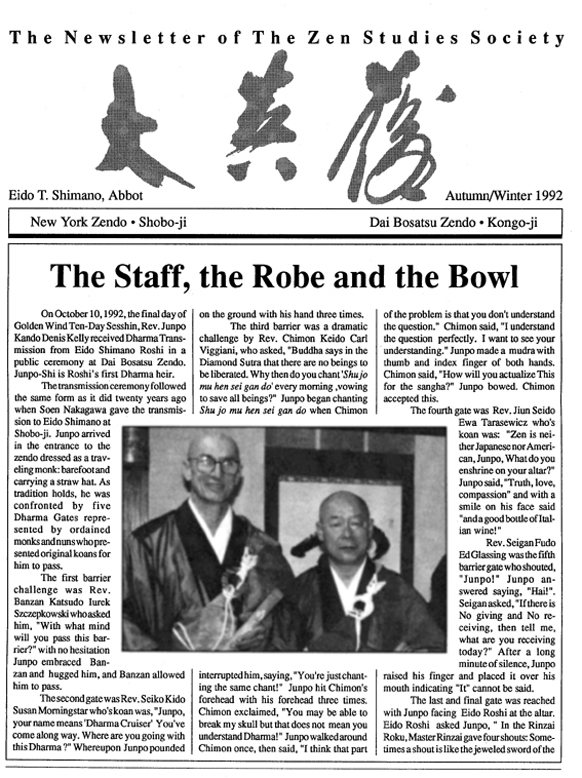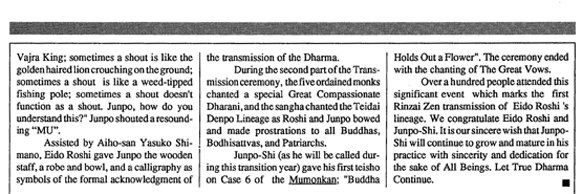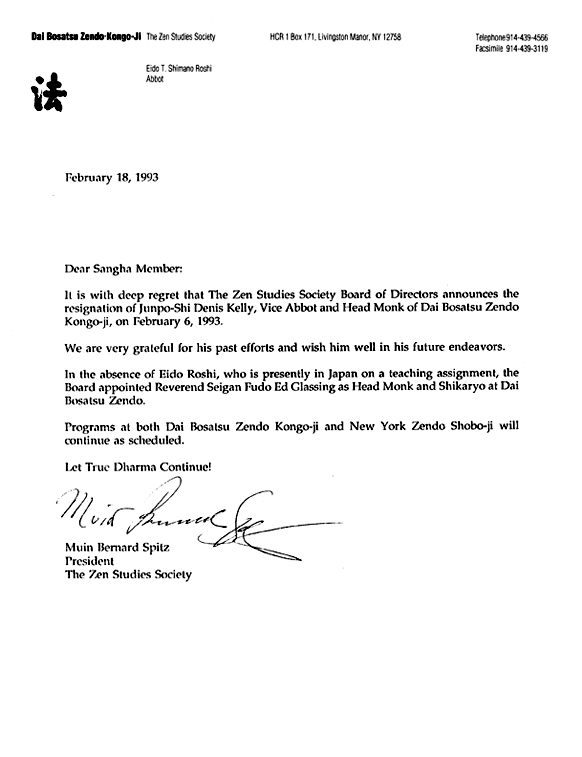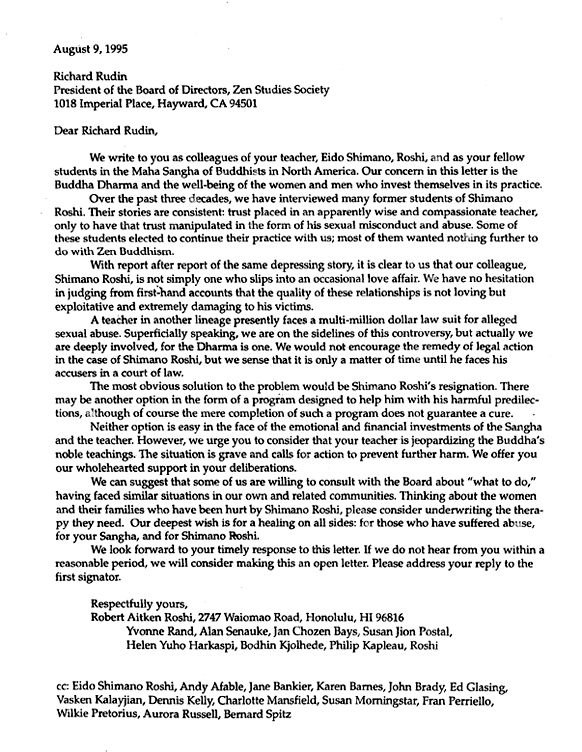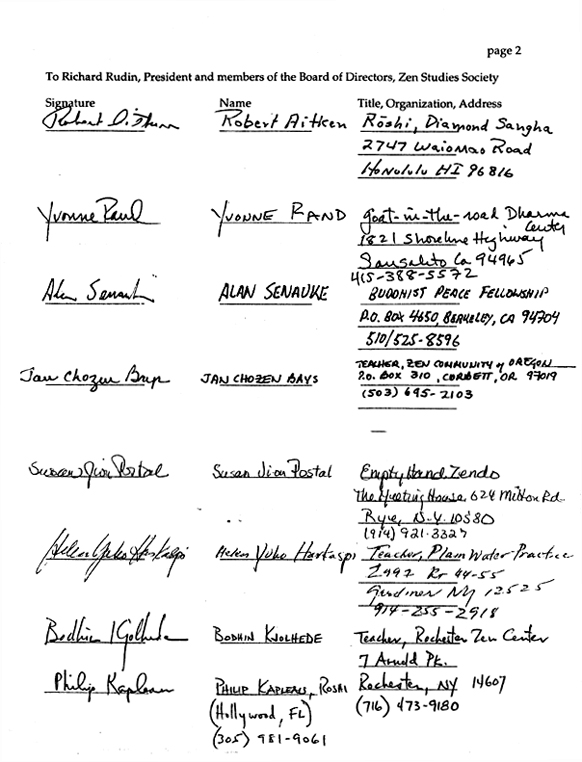Zen teachings have something to offer Western people, yet there are serious issues involving classism, racism, sexism and elitism associated with some Zen schools. The school I trained in is fraught with these issues coupled with a sociopathic attitude toward American people that isolate it from the very community it allegedly serves.
An almost universal difficulty in traditional Rinzai Zen’s transmission to the West is the apparent inability of many Asian teachers to differentiate between the elements of the tradition; specifically the Buddhist aspect and the Japanese cultural aspect. Some make claim that these elements are inseparable and have insisted on the adoption of Japanese cultural elements of the tradition irrespective of the West’s cultural spectrum. This has brought about splits in communities, herein lies the marrow of this present essay.
I greatly respect the technical training provided by Eido Shimano, Roshi, who I have been associated with for almost a quarter century. I am grateful for being able to have trained at his isolated country monastery, International Dai Bosatsu Zendo Kongo-Ji, in the town of Hardenburg, Ulster County, New York State. While many express a feeling of “debt” toward Eido Roshi, I can only express gratitude for what he has taught that has been of value to me and others.
The “debt” to the teacher concept somehow seems out of place in the broad-band, big picture perspective. Debts involve commerce, materialism, binding contracts for exchange. If we relate “debt” to our teacher do we not in a certain way commodify his teaching? Is it possible to “teach” as one to another or can only really “learning” take place within the practitioner? We might wish to offer respect, or gratitude - but debt I sense is out of place.
Can we incur a debt for being mistreated? If that mistreatment results in us making sure that we do not mistreat others? Can abuse become a commodity for exchange? It certainly is in prisons and power-over dynamic situations. It is called oppression.
If dedication implies absolute allegiance such that we support the creation of mythologies that are not truthful representations of history do we not do a disservice to others, ourselves and fail in our social responsibility?
What do we do when our awakeness and diligence collide with our dedication and just how dedicated to what, are we anyway? When something comes that we don’t like, it’s OK? How does this attitude relate to experiencing a prisoner being denied adequate medical care? Then when he dies from medical neglect -- No problem?
We can indeed refrain from making something out of nothing. But perhaps our awakened aspect perceives that there really is a “something” there that needs to be dealt with properly, our diligent aspect gets to work and makes nothing out of something.
When I wind up being in the position of serving as the spiritual advisor to a condemned person, I find it pretty absurd conceptualizing being joyful and cheerful after watching someone being executed. Cheerful and joyful are “mind-stuff umbrellas”.... myths to be lived by. We are above all human, we go through the gamut of emotional experience, we function, live and breathe through countless changes some of which are not at all joyful or cheerful. More umbrellas and myths. Watching the corporate media is an exercise in the observation of umbrella gathering, an umbrella fetish. The big myths we are provided with early in life, in grammar school social studies we are given the “Columbus myth.” On the corporate news we are given myths of “weapons of mass destruction.” We are bombarded with myths in such a way that we become like herd animals being channeled down paths of killing, brutality and belligerence.
The myth we were told about Columbus, the Federal holiday that was constructed around the myth are umbrellas of security used to hide from our collective conscience the awkward truth. It is a mistaken belief that creating myths can expiate social and community vipaka. The health and structure of society is built on real history not on myth. Myth is a tool of power, control and domination. It serves to create patterns of belief that the mythology is absolute truth, it is a mechanism used to define and affirm a fictitious reality.
When we see violence in our midst and all we know about is the mythology we have been sold as our history, we are befuddled and confused, we ask with a mask of surprise, how could this ever happen? ‘thing is, it’s always been happening. We have a legacy of violence that is woven into the warp and weft of our American societal fabric. We in America have a horribly violent history going back to Columbus himself and even further back under the institutions of feudalism and the Catholic church’s periods of inquisition. The next time you see a statue of Columbus in a park somewhere, stop for a minute. Look up at the figure, don’t read the plaque, that’s myth rubbish. Look at the dude and consider; he landed three little ships in Hispañola in 1492. In just a few years he was systematically cutting off the hands of the Teano people who did not bring him enough gold dust as tribute.
Inside of 55 years he, his sons and their cohorts had either killed or put into slavery 7/8ths of the Teano people. Columbus was the first “conquistador,” an absolute power over, totalitarian brute. This man did not discover any “new” world, it was quite thoroughly populated with people who had been living here for thousands of generations. The first thing the Europeans did was establish a hegemony through superior technology, brute force, systematic terrorism, murder, torture and slavery to confiscate the resources held by the First Nations people. This goes on still today.
So yeah, Columbus, he now does not sound so cool, not like what we were told as kids in school. Our society thrived on slavery for centuries, it killed most of the indigenous people and drove them off their land in the name of progress. We owned and traded in the lives of Black people and worked them to death.
There is a sort of social glue which ties the present to the past, things get passed down. Social patterns are propagated from generation to generation. Violence in the past persists as vipaka, the fruit of karma. We live in a violent society because we always have lived in a violent society, even though we have tried to use mythological umbrellas and academic falsification to shield us from our true societal burden.
Even if we do manage to create for ourselves an environment covered with all kinds of mythological umbrellas to protect us from unpleasentry, the truth is always there, lurking under the conscious mind. We collectively bear the burden of being the products of a society which has historically been based on power-over dynamics, brutality, violence, the distortion of the historical record and falsification of cultural identity. This stuff didn’t happen that long ago. The effects of centuries of slavery do not disappear in three or four generations, nor do ideas of being personally armed for “protection,” nor does experiencing an adrenaline rush during a chase scene in an action movie. It’s part of who we are irrespective of the constructed mythologies.
The problem is that the “umbrellas,” become like plates of armor. Every time an aspect of unpleasant truth shows itself, we quickly slap on another armor patch to protect and isolate ourselves. Isolation does not work either, buying a huge expanse of land in a remote area and trying to create a foreign community from a mythical past amounts to a distortion of cultural reality, delusions of grandeur and notions of racial supremacy. When critical thinking and systemic analysis are applied the entire concept grows stale rather quickly. It may appear to survive on double-think for a while but in the end it withers and dies.
So I kind of get that we create the past for the future in myth as a means of maintaining control, not at all out of concern for those of the future or perhaps even through a misguided concept of concern.
Most of us do not want to leave behind a legacy of arrogance and embellishment. Some wish to do just that - I’ve met one or two of those guys on death rows, the label the shrinks use is sociopath. It appears to mean someone who is socially ill. Someone who has not learned or been willing to really examine themselves thoroughly, to explore far enough to get beyond the myths, the need to control, the concepts of superiority, the psychological restraints that might have put in place around themselves through moral and ethical guidelines. Inside they are afraid of exposure, unwilling to stand naked and exposed for all to see.
This exposure business is painful, as a younger man I was “fearless” -- at least my self created mythology, which I carried around with me, said I was. Now, recovering from a triple bypass, being burned out with prison work, having watched the execution of two people I cared about, having been beaten unconscious by the police for exercising my first amendment rights, having abandoned my wife, lost every meaningful relationship after that, and being separated from the people I love most, living in constant physical pain, I am often frightened.
Much of my Zen training comes into play in dealing with my difficulties but at times there are elements of what I was taught that are obviously plain down right inappropriate. I want to talk about some of those contradictions here and in particular in regards to my relationship with Eido Shimano Roshi.
The primary aim of Eido Shimano’s line of Zen is the creation of “Dharma Heirs” all other considerations are secondary to this prime directive the continuation of the Rinzai mythology. The welfare of mainstream students is of little concern other than their ability to follow orders, pay fees and support the monastic institution. While the “dead heroes” of the monastery are mentioned once a month, their names read off in a boring ceremony, there is never a word of gratitude or even a word wishing well the hundreds and hundreds of people who were damaged by their tenure at the monastery. There is no liturgy for the mentally damaged people that line the road to Dai Bosatsu Zendo.
Lately Eido Shimano has been concentrating creating myths about himself in preparation for his death - re-writing history. He has for years now attempted to write his first Dharma Heir out of history by dismissing him as a “Dharma error.” His relationships with his friends and associates are embellished as significant Dharma events, as though their segment in time is of far more value than the present. I have never known a man with more enemies, more people he refuses to admit into his presence. I sometimes wonder how the Shimanos keep track of all their enemies.
His recent penchant for working on his mythology has involved doing video inventories of his collection of scrolls, vestments, art; he has had a video made that depicts him as a Dharma hero, it amounts to a commercial for an ethnic control freak.
I learned about this sort of practice when Soen Nakagawa Roshi died. Towards the end the man behaved as a lunatic. Once he was cremated and safely ensconced, out came the publication of the Soen Roku. The sayings and doings of master Soen. Now that the guy was finally dead, not pissing in the hallways, or climbing around on the eves of the roof, the mythology could be woven.
I was quite surprised to find included in the Soen Roku a little story I had written about Eido Roshi and sent to him as a gift; except that Eido’s name in the story had been changed to Soen. Soen’s dead, he can’t do anything nutty any more now; we can re-create him as a Zen Saint, the teacher of our own hegemonistic leader. It just sort of feeds on itself, the tales grow in length, only a positive view is presented. Out of an alleged tradition of “respect” or is it simply suspect? I never opened my mouth about the little story I wrote out of fear of upsetting or disrespecting Eido. I feel very different about it now.
There have been times I have witnessed instances of racism, sexism and classist denigration of people by Eido Roshi and his wife that have been egregious form this perspective. Such experiences have led me to profound questioning of the institution of at least this Rinzai Zen school in its transplantation to America. Eido one day informed a group of us that, “... the greatest disaster of the twentieth century was the loss of World War II by the Japanese.” I have been sickened to hear derogatory remarks from him over Korean and Chinese people. But then again, I am perhaps overly sensitive to “racial” issues because of my involvement in anti-racism work.
In 2001, a time of great need for EZF, our computer crashed, we were desperate to find an alternative. I called Denko John Mortensen a senior monk of our line because I knew he was in the computer business and might perhaps be able to help us out. I was pleased and grateful when he called back and told me that he had a machine that he would donate to EZF to bail us out. We made arrangements to drive up to his home/Zendo to pick up the donated machine. I took Dakota along, my partner and fellow activist.
We sat down to talk with Denko who at the time was the unannounced pick for Dharma Heir status, some light chit-chat about EZF and his Zendo. The topic came around to the Zen Studies Society and Eido Roshi came up. Dakota remarked to Eido’s chosen Dharma heir how troubled she was over Eido Roshi’s apparent racism, classism and sexism based on things she had gleaned from me and a brief meeting with Eido and Aiho Shimano. She was rebuked by the future Dharma heir’s commenting, “Oh he’s not racist, he’s just Japanese.” A few more words later concerning ethics and morals and Denko declares: “There are no morals in Zen...”
I nearly fell over, Dakota’s mouth dropped open and I quickly replied, “There is certainly no dogma in Zen but there are most assuredly morals and ethics. This is what the Great Vows and the Precepts are all about.”
Less than two years later, this man was given Inka Shomyo by Eido Roshi. Indeed, there appear to be no morals in Shimano’s Zen. The Great Vows for all, the Ten Precepts, none of these hold any moral sway, at least as far as telling the truth, maintaining control at all costs and indulging in power-over dynamics. From this perspective we seem to be being taught that in a completely isolated environment under the absolute control of a master of double speak, determined to recreate the manners and customs of mediaeval Japan that this can some how bring about awakening.
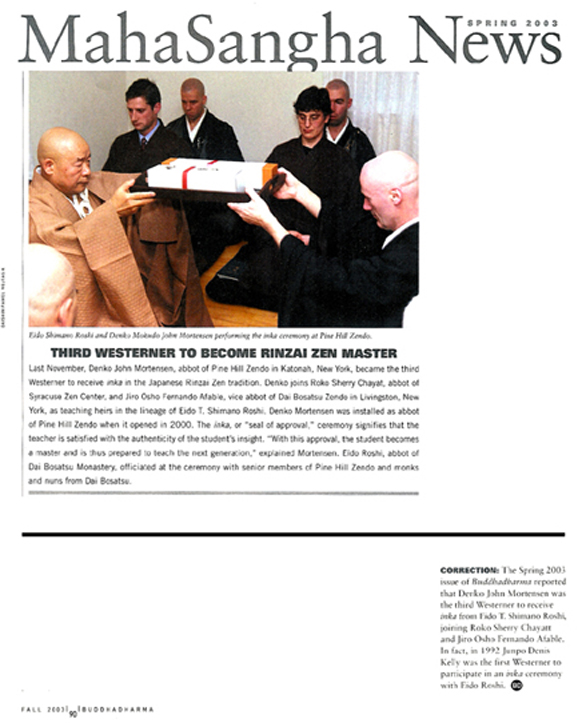
It was interesting to see this little correction two issues later. It perhaps did not have the “flash” of the announcement of the now obvious fourth westerner to become a Rinzai Zen master story, but “There are no morals in Zen..” It could appear that Shimano got better press, big color picture, article - indeed it was a “success” and hardly any one will pay much attention to the brief “correction” published in Buddhadharma two issues later.
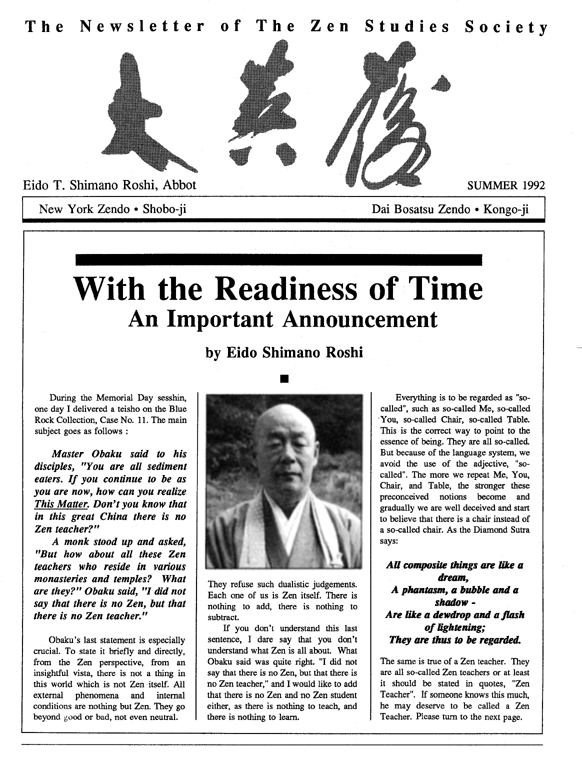
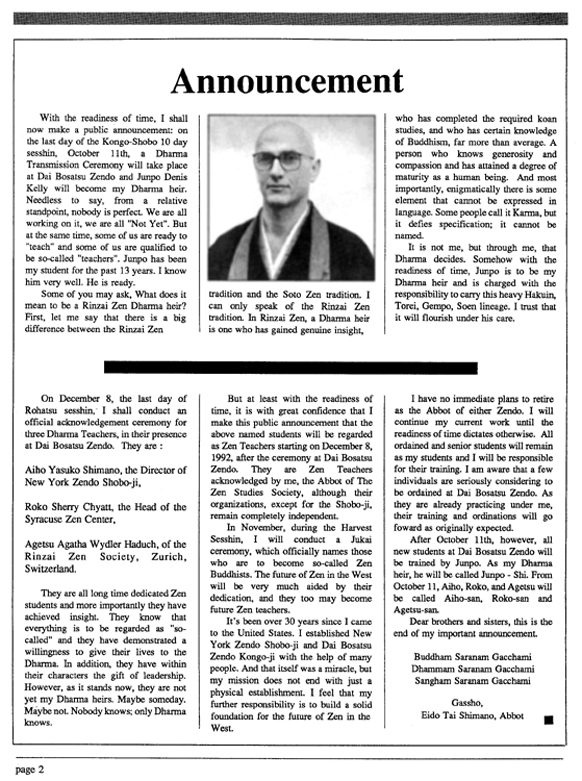
I read the public announcements of the organization when Junpo Kelly received Inka, I even attended the ceremony and the party afterwards. There were a hundred other people there too.
What actually took place there? Can Inka Shomyo be “conditional”? Is there some sort of “probationary period”? Is Inka something which can be withdrawn somehow? Can one’s awakening be publicly acknowledged and a short time later forgotten, a taboo subject, something which never happened?
The maneuver of writing Junpo Denis Kelly Roshi out of history I suspect has been designed by Shimano Inc. to avoid any possibility of Junpo Kelly moving into control of Dai Bosatsu Zendo when Eido dies. This revolves around Shimano’s knowledge that Junpo would drastically change DBZ and the practice of Rinzai Zen there. Junpo also can not be trusted to buttress the deliberately crafted mythology which Shimano has constructed around himself, nor will he continue to support “Japonification” of American Students.
I watched individual after individual fall out of favor and get “written out of history.” The most egregious such revision of the history of Dai Bosatsu Zendo was the recent public announcement, including a press release published in Buddhadharma a leading Buddhist magazine concerning Eido Shimano’s bestowal of “Dharma Transmission” on Denko John Mortensen. This event was announced as the ascension of his Third Dharma Heir. In reality, Junpo Kando Denis Kelly, who was his first publicly announced Dharma Heir was revised out of history, this due to a falling out over Eido Roshi’s lying to him about a sex scandal. So instead of having four officially sanctioned Dharma Heirs there are now three.....
One day in 1993, completely by surprise, I received a call from Aiho Shimano, Eido Roshi’s wife and director of New York Zendo in Manhattan. This was an unusual call, I was often called to repair and maintain the building and equipment at New York Zendo and receiving a call from Aiho about a leaky toilet or difficulty with the heating system was not out of place. This call however was different, she told me that she wanted to have a formal meeting with me in Manhattan as soon as possible.
I figured “formal meeting,” something’s up, I donned my robe and drove into the city. She greeted me and took me into the board meeting room and served tea. She told me that she wanted to talk to me right away so that I would hear the truth from the start because there were likely to be rumors appearing shortly. She had my attention.
The low-down on what she said to me was that I was a long time student a trusted member of the organization and someone of importance to be given this information directly. Now I was really intrigued..... She rambled out the following story I present in essence.
Eido Roshi had recently returned from a long flight from Japan and was driven straight up to Dai Bosatsu Zendo, some three hours from the New York airports. He arrived at DBZ very tired and travel weary. He retired to hi small apartment above the guest student hall and had a couple of drinks to settle him down after the long trip. The insinuation was that his travel weariness and the alcohol contributed to him forgetting to lock the door of his apartment before going to bed.
According to the story, in the middle of the night, a female student entered his unlocked quarters, took off all her clothes in his bedroom and crawled into bed with him. Given his state of mind, tiredness, the alcohol...... She said, “You know how men are....”
I was stunned...... I didn’t get why I was being told about this at all. The story was an obvious crock - on a gut level I knew I was being fed a prepared and completely fabricated story.
Sure enough, in a matter of days I heard from a Sangha person that Eido Roshi had an affair with a woman student from Colorado while she was in residence at Dai Bosatsu Zendo, that somehow the woman’s husband had found out about it and that a stink was being made.
I refrained from collecting all the juicy details, I’d heard such melodramas before. I kept to myself and remained a supporter of Eido Roshi by maintaining silence and distancing myself from the whole seamy business.
To be blunt, my relationship with Eido was not at all concerned with who he was sleeping with or not sleeping with. I figured it was none of my business. as it did not impact much on my life at all. At that time I failed to properly understand the nature of the power over dynamics paradigm. It was ten years later through the experience of working in prisons for a decade and the education I received from a woman social activist, Dakota Rowland, that I was able to grasp the depth of the situation.
I did at one point contact Junpo simply as a friend touching base shortly after my formal meeting with Aiho. He was distraught over this entire affair. When he had received transmission and in view of his position as vice-abbot of DBZ he had vowed with Eido Roshi to be totally honest in their communications. I told him of the basic rendition of the unlocked door scenario that had been painted for me and he admitted that the evidence to the contrary of that tale was overwhelming.
In short, he knew he was being led on, stone-walled like the rest of us, lied to by the Shimanos. I could never get how Aiho, banished to being the director of New York Zendo as a means of maintaining control over the Zendo and being kept away from Eido and Dai Bosatsu Zendo could so readily come to her husband’s defense.
Junpo felt betrayed in a major way, if wasn’t the transgression itself that was his issue, but the cover-up that dissolved the bond. Junpo resigned as Vice Abbot and left Dai Bosatsu Zendo. The scandal it seemed, took its own course, eventually reaching the board of directors of the Zen Studies Society. The board was always an odd conglomerate yet possessing one single criteria of unity, the unity of support for Eido Shimano under any, and all, circumstances. The single most important criteria for board membership always being almost personality cult devotion to the Shimanos.
Whatever happened in the board meetings concerning this particular sex scandal was soon compounded by one of the board members announcing her own sexual affair with Eido Roshi. She was soon removed and written out of history. I never really knew of the outcome of the board’s deliberations over these issues. We did receive a letter toward the end of February 1993 announcing the resignation of Junpo-shi Denis Kelly, as Vice Abbot and Head Monk of Dai Bosatsu Zendo. No reason or explanation was given. Here is a copy of the letter:
The only tangible effect from the board appeared to be an elaborately staged melodramatic “public apology” from Eido Roshi accompanied by his vow to never again let such a thing happen as long as he lived. I knew that the board had somehow managed to wheedle the Roshi into this “public apology” but I was aware of little else.
In time it was announced that there would be an important meeting held at New York Zendo and that senior students were to be present. I wondered about this meeting, it had been scheduled during the regular public night meditation meeting. When I showed up, the place was full, most of the people were first time beginner students it being a Thursday “public” night.
Eido Roshi’s cushion and sitting lectern were set up prominently in the center of the Zendo as if for a formal Teisho. My gut told me this was to be on ordinary “teisho” address. With somewhat muted pomp Eido assumed his seat. Aiho was quietly sniffling in the background initially.
Eido, without ever specifically explaining what he was apologizing for, in front of a crowd of people fresh off the street who had no inkling of the recent sex scandals listened to him go on for almost forty minutes over his profound regrets, deep sorrow, and iron clad vow to never ever let anything like this happen again. As he went on, only a handful of people even knowing what he was talking about, Aiho and another Japanese woman carried on incessant crying, sniffling and wailing in the background. They were particularly apparent every time Eido admitted that he had done this terrible un-named transgression.
Before we knew it we were being quietly and quickly ushered out of the building. The evening social tea meeting after public night zazen had been discontinued by Aiho driven by her constant fear that students grouped together and knowledgeable of the machinations of the organization were a threat to the Shimano control over the corporation. For years on the inside, for those aware and in touch with the flow of power in the Zen Studies Society, the organization was casually referred to as Shimano Incorporated.
I remember hitting the street that night with E-Kun, my partner at the time, both of us kind of stunned and left wondering just precisely what we had witnessed. Sometime later, some how through the Sangha grapevine, I heard that in making the “public apology” Eido Roshi had fulfilled his agreement with the Board. We were never able to make much sense out of the whole affair, it was distasteful to ask anyone about it because it was impossible to know the position of the person in advance or whether one would get the truth or some spin-doctored fairy tale. An aspect of theocratic dictatorship I presume.
Some six month later I was anonymously sent a copy of another letter signed by eight distinguished American Zen teachers calling for Eido Roshi’s resignation. Here is a copy of the letter:
Quite some time later I was invited to attend a meeting of teachers at a nearby Zendo where we each given a brief opportunity to speak to the gathered students. I remember speaking about my prison work and explaining the work of The Engaged Zen Foundation.
After we all spoke and Zazen was concluded, there was an opportunity for the attending students to interact with the teachers. I was surrounded by a group of people and answered questions about my prison work. At one point a woman I recognized but could not recall her name stepped forward and introduced herself. It turns out she was a former member of the Zen Studies Society Board of Directors who had resigned following her taking part in deliberating Eido Roshi’s apparent transgression of sexual misconduct with another woman and admitted to the board that she herself had also been having a sexual affair with Eido Roshi.
She was really aggressive and confrontational and demanded why I had not warned her about Eido Roshi. She castigated me for supporting him and being “one of his monks” and went on to accuse me of permitting my ex-wife to have an affair with Eido Roshi. This was done in public, in front of a group of people who were visibly stunned by her accusations. I was flabbergasted beyond belief, particularly by her insinuations about my ex-wife and the mother of my children.
I roared out at the top of my lungs, in a church/Zendo no less, that she was completely out of her mind and that she should get away from me immediately. She at that point tried to attack me and was fortunately physically restrained by some of the students and led out of the building. I was mortified - I had completely blown my cool in front of at least fifty people an half a dozen distinguished Zen teachers.
I have watched the Shimano’s treat people with money and in particular Japanese people with extraordinary attention giving them preference over poorer, Caucasian and Black students. I have watched his wife deliberately hassle Black people and be very rude to them for simply showing up on the center’s “open to the public” night. I’ve experienced other students respond in disgust at such treatment only to remain silent out of fear of the inexcusable disregard of “respect” that any such expression would entail.
At one point his wife asked one of my prison volunteers why she spent time going up to Sing Sing prison to teach. Aiho asked, “Why to you bother with them, don’t you realize that it is their karma to be there?” My volunteer responded splendidly by saying, “....and it is my karma to be there with them teaching.”
Suffice it to say, that over two decades of association with these folks produced several major sex scandals, all sorts of unethical accusations and a number of major upsets within the Sangha.
The school I trained in is fraught with issues that isolate it from the community. Corpocracy and patriarchy are two of the most glaring aspects. Insensitivity and complete unwillingness to respect American cultural mores have been a hallmark of Eido’s presentation of Buddhadharma. Things which he knows full well do not fit into American culture he propagates and ignores their consequences. At one point he obtained a highly ornate silk brocade ceremonial hat. He adopted the practice of wearing this hood like, brocade hat with a dropped collar and forward curved peaked top at important ceremonies.. When I first saw him wearing this hat I was stunned because I immediately recognized how the hat could be construed as being highly offensive and insensitive to the Black community.
The hat was bothersome to say the least, when I was ordained a full priest in 1993, I asked that the ceremony be conducted in Sing Sing prison so that some of my prisoner students would be able to witness the event. I did have to make one very strongly worded statement to Eido Roshi’s attendant, and that was: Do everything in your power to insure that “the hat” did not make it into Sing Sing prison. The last thing on earth we needed in there was a man dressed looking like the grand imperial wizard of the Ku Klux Klan conducting an ordination ceremony in front of a largely Black audience being held in slavery under The Thirteenth Amendment to the Constitution.
I was devastated several days later when the student who had driven Eido Roshi and his wife to the prison for the ceremony told me that they were both disgusted by the venue, her commenting that, “It was the biggest mistake they had ever made...” going into Sing Sing Prison. It somehow was not at all a “grand enough” place for a Shimano ordination, it mattered not one iota how important it was to E-Kun and I and the men we had been working with for years.
In any event, suffice it to say, grandiosity is a trademark of the Zen school in Japan. It is offensive that vestments can be purchased from Japanese clerical catalogs that list for over $40,000. Forty grand and more for a “costume” that originally was made as a garment from discarded burial shrouds and gleaned hand made textiles in the time of the Buddha. Eido’s wardrobe over the decades has grown in leaps and bounds, becoming more and more ornate as time progressed. These days he can be seen wearing highly ornate brocade robes costing more that an average American working family makes in a year.
My question is - Where does the awakening come into play? How does a grand costume make traverse of the path of the awakened state of mind better for anyone? If such extravagances are expected in Japan as evidenced by the criminally expensive Kesas for sale in the vestment catalogs, then something has gone awry. Material success appears to be expected at least in Japan of so called great teachers, corruption reigns.
For a long time I have been considering what I have come to call “Broad-Band Awakening” Involving not simply kensho, personal awakening, but also awakening to the social, cultural, psychological, economic, ecological and political arenas as an integral expression of full awakening.
I have asked why, at New York Zendo, the tradition of having tea with new students after the introductory night Zazen was discontinued when Aiho Shimano took control. I have asked why The Society does not use its facilities to prepare soup and meals to feed homeless people, why there are never any clothing drives for those people in need? I already know in my heart that doing such activities are “dirty” and beneath the grand drama of bringing “True Dharma” to the West. Besides, if people are homeless, they are dirty, they smell, they are beneath our consideration, after all it is their “karma:” they are just existing in their own self created worlds of suffering and are of no concern to us practitioners of the “True Way.” “If only I could give him this beautiful moon.....”
In the case of Eido Shimano, he resists admitting error – especially when the admission damages his career and reputation. He very much subscribes to the notion of “closure” the adoption of a belief system that arbitrarily determines that at some specific point the past, whatever it may have entailed, is over and done with. The consequence of such thinking and acting is the development of functional mythologies and personality centered veneration so that we are always led to be reassured that the right thing was done or that nothing at all negative ever happened. This involves the creation of mythology, the revision of the historical record in such a way so as to always place the Shimano’s in the best possible light despite the harm and damage done to others directly and indirectly.
Many may criticize my writing as an effort to spread dissension in the Sangha, it is anything but. As Dr. Cornel Pewewardy, a Comanche and Kiowa, Professor at the University of Kansas states: “Inaction in the face of racism is racism. As culturally responsive educators, we must understand that "enslaved minds cannot teach liberation."
For every single case of sexual misconduct on Eido Roshi’s part, large numbers of Zen Studies Society Sangha members were hurt, misled, lied to and told to keep quiet or get lost. How many times? In my quarter century association with Eido Shimano I can recall four cases involving major sexual scandals which divided and alienated the Sangha. Not just one or two people leaving disgruntled, but vast numbers falling away in utter disgust. Those who thus disappeared were never again to be brought up or talked about, their contributions, practice and efforts to support the Society were forever to be forgotten.
The positions of the banished and disillusioned people are quietly filled by new eager students, most of whom are totally unaware of the reason for their ascension and the status quo of the Shimano total control regime goes on as if nothing ever happened.
Let me clarify the terms here, and let my position be made clear. I could care less what two consenting and equal adults do on their own time in their own privacy. That is none of my, or anyone else’s business. However, when there are vast inequalities in social, political, financial or power over dynamics at play then the situation becomes far more complex. This is some of the issue surrounding the legal aspects of sexual relations between prisoners and guards. In the majority of states any form of sexual contact between a guard and a prisoner is illegal for good reason, the fundamental inequality and power over relationship which exists in the separate roles. Interestingly there is still at lease one state where such sexual conduct is not a criminal offense.
In the instance of spiritual teachers, and specifically those in the patriarchal and power-over driven zen sects the issue is one of vast inequality. This inequality is created by the lineage mythology, elements of Japanese culture, notions of racial supremacy, cultural stereotyping and lack of respect for the host culture. When these elements encounter people seeking spiritual guidance in an isolated and stress dominated environment, their vulnerability to manipulation and coercion is severely compromised.
If Eido Roshi wants to have an affair, that’s fine with me, he can go out to a bar and pick up a woman any time he may so choose. I have no interest in his sexual affairs as long as they are off campus and do not involve him using his position of authority as a power-over manipulation technique. He can hit on a waitress in a diner, pick up a stewardess between flights, whatever the case may be. However, In the position of Abbot of a Monastery he exercises absolute power over the lives of those in residence. If he declares tomorrow is a day off, it just is, no questions asked. If he demands that my son with a torn annular disk and so anxious to follow in my footsteps perform extra heavy work to pay for his room and board while in training he can do so, there is no discussion, his word is law. His role is absolute, above question and beyond reproach.
If he makes melodramatic vows in public to refrain from conveniently undefined sexual misconduct and at 70 years old still resorts to inviting women students up to his monastery apartment with offers of alcohol and promises of special treatment what does this tell us?
There are no safe guards in place in the Zen Studies Society regarding Eido Shimano’s behavior. He and his wife hand pick board members for one purpose only, the Shimano’s perceived ability to maintain control over them and their complete and utter “loyalty” and “respect” for Eido. His Dharma heirs are in no position to offer challenge, one simply threw up his hands and left in utter disgust, the other safely maintains her distance with the responsibility for her own center, the other gets slowly burned out, worked to death, receives bogus promises and jumps ship at the first opportunity. The latest heir declares “There are no morals in Zen.” and is chosen to be Vice Abbot.
What Eido has dreamed of as the flowering of Rinzai Zen in the West will soon fade away. His arrogance in thinking that he can somehow magically transform Americans into pseudo-Japanese will bear bitter fruit for it lacks what he desires most from his students but is most unwilling to give -- respect.
Kobutsu MaloneSeptember 18, 2003
